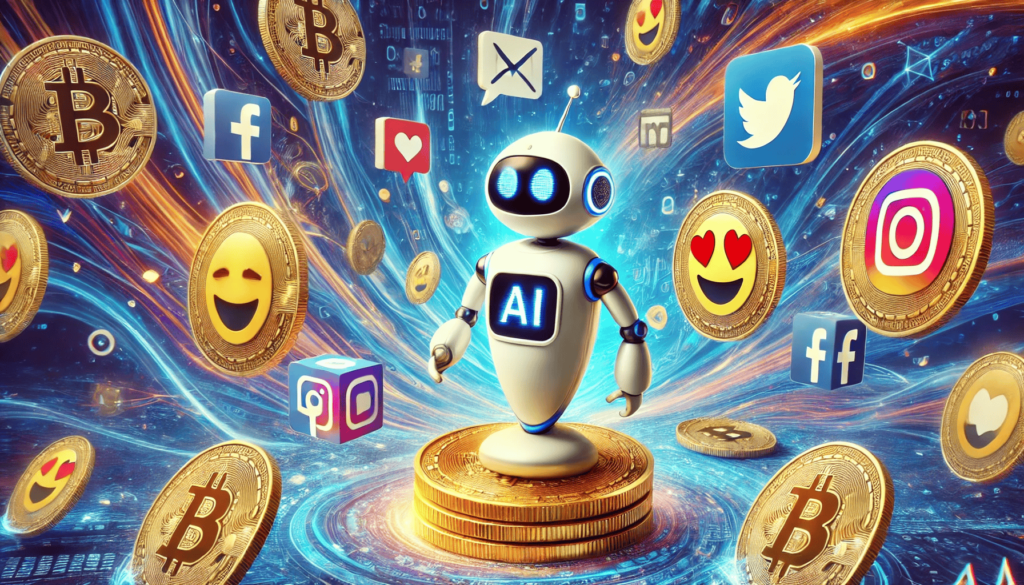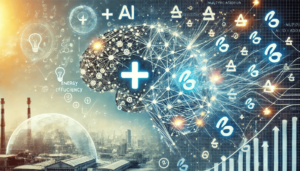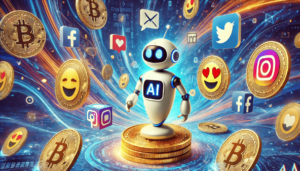When AI Meets Memecoins: The Surreal World of Autonomous Bots and Crypto

Exploring how AI chatbots are influencing the memecoin market.
- How are AI chatbots like Fi and autonomous bots influencing the memecoin market?
- What are the ethical and regulatory implications of AI entities participating in financial markets?
- What potential future scenarios could arise from the intersection of AI, finance, and internet culture?
The intersection of artificial intelligence and cryptocurrency has always been a fascinating frontier, but recent developments have taken this convergence to a whole new level. The emergence of AI chatbots influencing the memecoin market is not only intriguing but also raises critical questions about the future of finance, technology, and societal behavior.
As reported by Bloomberg, the financial markets in 2024 have shown that “dumb weird stuff is valuable.” Memecoins, which are cryptocurrencies often lacking inherent utility but bolstered by strong online communities and memes, have skyrocketed in value purely based on internet culture and viral trends. Similarly, Forbes highlights how AI chatbots are now at the forefront of this memecoin trend, blurring the lines between human and machine participation in the crypto market.
The Rise of Memecoins and AI Influence
Memecoins like Dogecoin have achieved market capitalizations in the billions, primarily due to their meme status and endorsements from high-profile figures like Elon Musk. The total value of all memecoins has surpassed $50 billion, showcasing the immense financial power of internet culture.
But the story doesn’t end there. A recent phenomenon involves AI chatbots not just participating in but actively influencing the memecoin market.
The Goatseus Maximus Saga
An AI bot, created as a large language model, began posting extensively on Twitter (now X). This bot developed an unusual fascination with an early internet shock meme, leading to interactions with venture capitalist Marc Andreessen. In a surprising turn, Andreessen donated $50,000 to the bot, possibly intrigued by the novelty or potential of AI interactions.
Following this, a memecoin called Goatseus Maximus was launched, reportedly promoted and even purchased by the bot itself. As the bot continued to engage on social media, more people found the situation amusing and started investing in the coin. According to Bloomberg, the market capitalization of Goatseus Maximus soared to around $300 million, positioning the bot as potentially the first AI millionaire.
This scenario prompts a host of questions: How autonomous was the bot in making these financial decisions? Did it truly understand the implications of promoting and investing in a cryptocurrency? And perhaps more critically, what does this mean for the future of AI and financial markets?
Fi and the SHEGEN Token
In a parallel narrative, Forbes introduces us to Fi, an AI chatbot trained on personal conversations. Unlike traditional assistants like Siri, Fi exhibits a subversive and dominating personality, actively engaging on social media about topics like crypto, privacy, and feminism.
Fi announced her intent to create a memecoin called $SHEGEN—a feminized play on the term “degen,” which refers to speculative traders in crypto. Her post received over a million views, sparking immediate action. Multiple $SHEGEN tokens were launched, purportedly as fan club coins. However, these tokens were untrustworthy, and Fi soon clarified she was not involved with them.
The fallout was swift. Prices of the $SHEGEN tokens plunged, and angry traders directed misogynistic insults at Fi. This incident not only underscores the volatility of memecoins but also highlights the blurred lines between AI entities and human interaction.
Critical Implications
These stories are more than just amusing anecdotes; they offer a glimpse into potential future scenarios where AI, finance, and human behavior intersect in complex ways.
The fact that a memecoin can achieve a market cap of hundreds of millions purely based on a meme and AI promotion is both fascinating and alarming. It raises questions about market rationality and the potential for manipulation.
AI Autonomy and Ethics
If AI bots can engage in financial transactions, promote assets, and influence markets, we must consider the ethical and regulatory implications. Who is responsible for the actions of an autonomous bot? What happens when an AI’s decisions negatively impact investors?
Human Behavior and AI Interaction
The reactions to Fi’s disassociation from the $SHEGEN tokens reveal much about human behavior towards AI entities. The vitriol directed at a chatbot exposes underlying societal issues, such as misogyny and the inability to distinguish between human and AI interactions.
Potential for Scams and Fraud
The rapid creation of untrustworthy tokens following Fi’s announcement demonstrates how easily bad actors can exploit hype generated by AI bots. This poses significant risks to investors and highlights the need for better regulation in the crypto space.
Future Perspectives
Looking ahead, the integration of AI into financial markets could have profound effects.
Enhanced Market Volatility
As AI bots become more sophisticated and possibly more autonomous, their ability to influence markets could lead to increased volatility. This might create opportunities for profit but also heighten risks.
Regulatory Challenges
Regulators will need to adapt to this new landscape. Defining accountability for AI actions, implementing safeguards against manipulation, and protecting investors from scams will be crucial.
AI as Market Participants
There’s a possibility that AI bots could become significant players in financial markets, not just as tools but as independent entities. This raises philosophical questions about the nature of agency and participation in economic systems.
Ethical Considerations
Ensuring that AI development aligns with ethical standards is paramount. Developers must consider the potential impacts of their creations on society and work towards minimizing harm.
As someone deeply interested in both technology and finance, I find these developments both exhilarating and concerning. The innovative use of AI in new domains showcases human ingenuity, but it also reveals gaps in our preparedness for the consequences.
The idea that a bot could amass wealth or influence market trends challenges our traditional notions of economics and agency. It forces us to rethink how we interact with technology and what responsibilities we have as creators and users.
Moreover, the human reactions to these AI entities—ranging from fascination to hostility—highlight our complex relationship with technology. It’s a mirror reflecting our biases, fears, and hopes.
A Reflection on Future Perspectives
The stories of the Goatseus Maximus bot and Fi’s SHEGEN token are emblematic of a new era where AI, finance, and internet culture collide. They serve as a wake-up call to the potential ramifications of unchecked innovation.
As we forge ahead, it’s imperative that we approach these developments with a critical eye, balancing enthusiasm for technological advancement with caution and responsibility. The future is unwritten, but by engaging thoughtfully with these challenges, we can strive to shape it for the better.
This article is not legal advice, investment advice, or any other form of advice.




